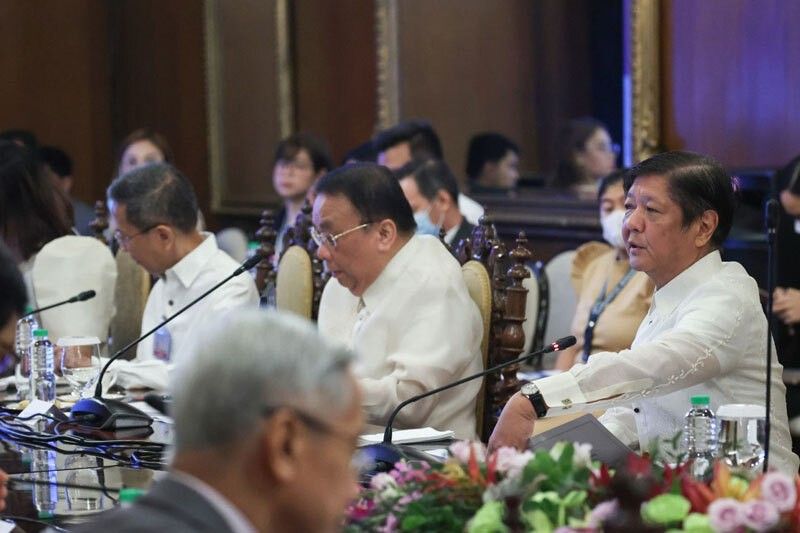UP econ profs: 'Defective' Maharlika bill has unclear purpose, risky structure

MANILA, Philippines — In a strongly-worded paper that outright calls the proposed Maharlika Investment Fund “defective” and violative of economic principles, faculty members of the University of the Philippines School of Economics have expressed their reservations with the Marcos administration's pet measure.
The UPSE faculty members — in their "autonomous personal capacities" — levied criticisms against the MIF’s “unclear purpose” and “unnecessary risks” in a 28-page discussion paper titled, “Maharlika Investment Fund: Still Beyond Repair.”
The paper also discusses the "red flags" in the MIF's governance structure and how preoccupation with the MIF has diverted crucial attention from more urgent national issues, such as the need to reform the retirement and pension system for military and uniformed personnel.
“We find that the MIF violates fundamental principles of economics and finance and poses serious risks to the economy and the public sector — notwithstanding its proponents’ good intentions,” the discussion paper read.
This is the second discussion paper released by the UPSE in 2023. UPSE faculty, graduate students and alumni occasionally release discussion papers on various economic issues that are publicly accessible through the UPSE archive.
The last UPSE discussion paper written by five or more authors who are also faculty members was released in 2020 and dealt with the Philippines' economic recovery from the COVID-19 pandemic.
Unclear raison d’être
Comparing the MIF to other similar investment funds in other countries, the authors of the paper said the Philippines' version lacks a "clear focus" at the outset, which has led to confusion even among the measure's proponents and supporters.
The authors wrote that “while the MIF will invest in financial instruments in a bid to earn commercial returns,” it will also pump funding into local development projects – a “double-bottom line objective.”
The text of the measure should explicitly lay out whether it is a sovereign wealth fund, sovereign development fund or a strategic investment fund, the paper read. "Clear goals serve to delimit an SWF's allowable investments and activities, and lay down reasonable expectations and metrics of success."
Due to its “confused goals,” the paper read, “the MIF bill does not adequately articulate and take account of several implications of the fund’s dual-bottom line objective.”
In response, House ways and means chairperson Joey Salceda, who is among the authors of the re-engineered version of the bill after passing the lower chamber, said that the “double bottomline approach” is practiced by every major company in the world.
Salceda said the bill did not imply substituting real financial returns with developmental outcomes. “If anything, we emphasized during the discussions in the House that projects such as dams, grids, and toll roads are very profitable, if long-gestating projects,” he added.
The MIF is also not in line with the country’s long-term economic roadmap in the Philippine Development Plan 2023-2028, which could pose risks during unstable political conditions, according to the paper.
The bill is also “vague about MIF’s expected financial and economic returns,” the paper read.
“Without anchoring the MIF on specific long-term development objectives, the MIF (especially if it is large enough) may pose macroeconomic risks and become prone to exhaustion when the political environment is unstable or incumbent officials prioritize short-term goals,” the paper noted.
Poor governance structure
“With a lack of initial funds and with financing schemes that pose moral hazard risks, it is all the more imperative that the Maharlika Investment Corporation — which will manage the MIF — should have a top-notch governance structure and sufficient checks and balances in order to run smoothly, avoid politicization, and establish legitimacy,” the paper read.
However, the measure has a “poorly designed” governance structure that “opens the floodgates for political interference, mismanagement, and corruption,” the faculty members argued.
The paper also batted for a private-sector-led board with mostly independent members to manage the MIF.
Diverting attention
The paper also cited the urgent need for the government to shift their focus from the MIF the looming "fiscal crisis" stemming from the ballooning pensions for military and uniformed personnel (MUP).
“However, by choosing to pour their energies into the MIF, lawmakers and the economic team are only adding to — and not abating — the nation’s fiscal strain,” the paper read.
By taking P50 billion from the national government, “the MIF takes away precious funds from the public coffers — funds that could be spent instead on myriad developmental projects with surer or more tangible returns, like conditional cash transfers, nutrition programs, universal health insurance, or active transportation projects.”
“We must prioritize fiscal and financial stability, transparency, and prudence over speculative gains and uncertain financial experiments,” the paper read.
- Latest
- Trending





























